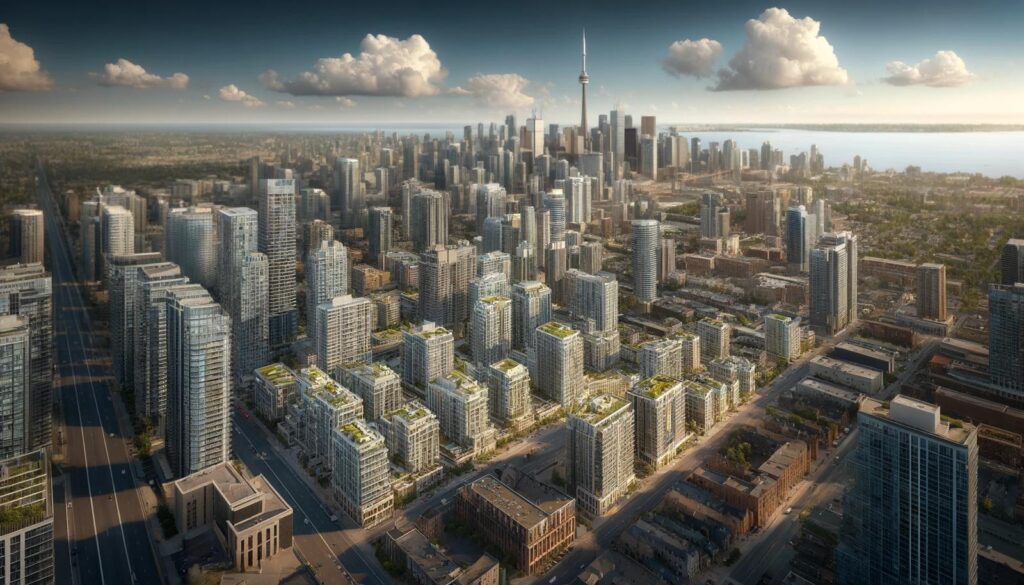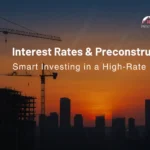Introduction – Toronto real estate market 2024
The Toronto real estate market is known for its dynamism and resilience. As we step into 2024, the market continues to evolve, driven by various factors such as economic conditions, government policies, and demographic trends. Whether you’re a first-time homebuyer, a seasoned investor, or a homeowner looking to sell, understanding the nuances of the Toronto real estate market is crucial. This comprehensive guide aims to provide you with insights, trends, and tips to navigate the Toronto real estate market in 2024 effectively.
Toronto Real Estate Market Overview
Current Market Conditions
As of late 2023, the Toronto real estate market is characterized by a continuation of trends seen in previous years, albeit with some notable shifts. The market remains competitive, with strong demand for properties outstripping supply in many areas. This imbalance has led to continued price growth, albeit at a more moderate pace compared to the rapid increases seen in previous years.
One key trend in the market is the continued popularity of condominiums, particularly in the downtown core. Condos continue to be a popular choice for both investors and residents, driven by their affordability relative to detached homes and their proximity to amenities and transit.
Another notable trend is the increasing popularity of suburban and outlying areas. As buyers seek more space and affordability, areas outside of the city core, such as Scarborough, North York, and Etobicoke, have seen increased interest. This trend has further accelerated by the rise of remote work, which has allowed buyers to prioritize space and affordability over proximity to the downtown core.
Key Factors Influencing the Market
Several key factors are influencing the Toronto real estate market in 2024, shaping its trajectory and dynamics. One of the most significant factors is the state of the economy, both locally and globally. Economic conditions, including employment levels, interest rates, and GDP growth, play a crucial role in determining buyer sentiment and affordability.
Government policies and regulations also have a significant impact on the market. Changes in mortgage rules, tax policies, and land-use regulations can all influence the supply-demand dynamics in the market and affect prices and sales activity.
Demographic trends are another important factor. Toronto’s population is growing, driven by both natural increase and immigration. This population growth fuels demand for housing and can impact both the rental and ownership markets.
Finally, market sentiment and investor confidence play a crucial role in shaping the market. External factors such as geopolitical events, global economic conditions, and even local media coverage can all influence how buyers and sellers perceive the market and make decisions.
Price Trends and Predictions
Historical price trends indicate that the Toronto real estate market has been on a steady upward trajectory for the past decade. However, the pace of price growth has moderated in recent years, with prices increasing at a more sustainable rate.
Looking ahead to 2024, experts predict that prices will continue to rise, albeit at a slower pace. Factors such as continued population growth, low interest rates, and a strong economy are expected to support demand for housing and keep prices elevated.
However, there are some risks and uncertainties on the horizon that could impact price growth. Rising interest rates, changes in government policy, and external economic shocks could all dampen demand and put downward pressure on prices.
Overall, while the Toronto real estate market remains robust, buyers and sellers should approach the market with caution and stay informed about the latest trends and developments.
28 Bobmar Road garden suite is a prime investment opportunity in Scarborough, offering modern amenities and a serene environment.
Buying Property in Toronto
Best Neighbourhoods for Investment
When considering buying property in Toronto, it’s important to choose a neighbourhood that aligns with your investment goals. Key criteria to consider include:
- ROI Potential: Look for neighbourhoods with strong potential for appreciation. Areas undergoing revitalization or with planned infrastructure improvements often offer good investment opportunities.
- Community Amenities: Consider neighbourhoods with access to parks, schools, shopping, and other amenities. These factors can influence property value and desirability.
- Accessibility: Proximity to public transit, major highways, and employment hubs is important. Neighbourhoods with good transportation links tend to attract tenants and buyers.
Some of the top neighbourhoods for investors and homebuyers in Toronto include:
- The Annex: Known for its historic homes and proximity to the University of Toronto, The Annex offers a mix of detached homes and condos.
- Leslieville: This east-end neighbourhood has seen significant gentrification in recent years, with a mix of trendy shops, restaurants, and housing options.
- Yorkville: Known for its upscale shopping and dining, Yorkville offers luxury condos and high-end retail, making it attractive to affluent buyers.
- Liberty Village: A former industrial area, Liberty Village has been transformed into a vibrant community with condos, townhouses, and amenities.
- King West: Popular with young professionals, King West offers a mix of condos, lofts, and townhouses, along with trendy restaurants and nightlife.
Tips for First-Time Home Buyers
Buying your first home in Toronto can be daunting, but with the right knowledge and preparation, you can navigate the process successfully. Here are some tips for first-time homebuyers:
- Understand Mortgage Qualifications: Familiarize yourself with the mortgage qualification process, including credit score requirements, debt-to-income ratios, and down payment options. Getting pre-approved for a mortgage can help you determine your budget and make you a more competitive buyer.
- Navigate Bidding Wars: In a competitive market like Toronto, bidding wars are common. To increase your chances of success, be prepared to act quickly, make a strong offer, and consider including a personal letter to the seller to make your offer stand out.
- Consider Different Housing Types: Toronto offers a variety of housing options, including condos, townhouses, and detached homes. Consider your lifestyle and budget when choosing the right type of property for you.
- Work with a Real Estate Professional: A knowledgeable real estate agent can guide you through the buying process, help you find suitable properties, and negotiate on your behalf.
- Factor in Additional Costs: In addition to the purchase price, consider other costs such as closing costs, property taxes, and maintenance fees. These can add up and affect your overall budget.
By following these tips and doing your research, you can make informed decisions and find the perfect home in Toronto.
Selling Property in Toronto
Preparing Your Home for Sale
When selling your property in Toronto, making a positive first impression is key. Here are some tips for preparing your home for sale:
- Home Staging: Consider hiring a professional stager to showcase your home in the best possible light. Staging can help potential buyers envision themselves living in the space.
- Renovations and Repairs: Address any major repairs or renovations that could detract from the value of your home. Focus on updates that offer a high return on investment, such as kitchen and bathroom upgrades.
- Declutter and Depersonalize: Remove personal items and excess clutter to help buyers envision the space as their own. Consider renting a storage unit to temporarily store items that are not essential.
- Enhance Curb Appeal: The exterior of your home is the first thing buyers will see. Ensure that the exterior is well-maintained, with a tidy yard and fresh paint if needed.
- Professional Photography: Invest in professional photography to showcase your home online. High-quality photos can attract more buyers and lead to quicker sales.
The Selling Process
Selling a property in Toronto involves several steps. Here is an overview of the selling process:
- Set a Realistic Price: Work with your real estate agent to determine a competitive price for your property based on market conditions and comparable sales.
- Market Your Property: Your agent will market your property through various channels, including online listings, open houses, and networking with other agents.
- Negotiate Offers: When you receive an offer, your agent will help you negotiate the terms to ensure you get the best possible price and conditions.
- Acceptance and Closing: Once you accept an offer, the buyer will conduct inspections and finalize their financing. The closing process involves transferring ownership of the property to the buyer.
- Legal Considerations: It’s important to work with a real estate lawyer to ensure that all legal requirements are met and that the sale is completed smoothly.
- Realtor Selection: Choosing the right real estate agent is crucial. Look for an agent with a proven track record in your neighbourhood and who understands the local market.
By following these tips and working with a knowledgeable real estate agent, you can maximize the sale price of your property and navigate the selling process with ease.
The Future of Toronto Real Estate
Upcoming Developments
Toronto is a city that is constantly evolving, and this is reflected in the numerous real estate developments that are currently underway or planned for the future. Some of the major developments that are expected to have a significant impact on the market include:
- Rail Deck Park: This ambitious project aims to transform a large section of unused rail lands into a sprawling urban park. The park is expected to increase property values in the surrounding area and attract new residents and businesses.
- Sidewalk Toronto: A partnership between Waterfront Toronto and Alphabet’s Sidewalk Labs, this project aims to create a new high-tech neighbourhood on Toronto’s waterfront. The development will feature innovative technologies and sustainable design principles.
- Mirvish Village: This mixed-use development is located in the Annex neighbourhood and will feature residential, retail, and cultural spaces. The project is expected to breathe new life into the area and create a vibrant community hub.
- The Well: Located at the corner of Front and Spadina, The Well is a massive mixed-use development that will feature residential, retail, and office space. The project is expected to revitalize the area and create a new destination in downtown Toronto.
- East Harbour: Located on the eastern edge of downtown Toronto, East Harbour is a mixed-use development that will feature office, retail, and entertainment space. The project is expected to create thousands of jobs and attract new businesses to the area.
Innovations in Real Estate
Technological advancements and sustainable housing trends are shaping the future of real estate in Toronto. Some of the key innovations that are expected to impact the market include:
- Smart Homes: Increasingly, homes equipped with smart technology that allows homeowners to control various aspects of their home, such as lighting, heating, and security, from their smartphones.
- Green Buildings: With a growing focus on sustainability, green buildings are becoming more prevalent in Toronto. These buildings are designed to be energy-efficient and environmentally friendly, reducing their carbon footprint.
- Virtual Reality: Virtual reality technology is changing the way real estate is bought and sold. Buyers can now take virtual tours of properties from the comfort of their own homes, making the home-buying process more convenient and accessible.
- Co-living Spaces: Co-living spaces are becoming more popular, especially among young professionals and students. These spaces offer a more affordable and communal living experience, with shared common areas and amenities.
- Blockchain Technology: Blockchain technology used to streamline the real estate transaction process, making it faster, more secure, and more transparent.
Overall, the future of real estate in Toronto is exciting and full of potential. With a focus on innovation and sustainability, the city poised to remain a vibrant and desirable place to live for years to come.
Investment Opportunities
Residential vs. Commercial Investments
When considering real estate investments in Toronto, investors often debate between residential and commercial properties. Each type of investment offers unique benefits and risks:
Residential Investments:
- Stability: Residential properties tend to be more stable, with steady rental income and less volatility in value compared to commercial properties.
- Tenant Turnover: Residential properties may have higher tenant turnover, leading to more frequent vacancies and turnover costs.
- Liquidity: Residential properties are generally more liquid than commercial properties, meaning they can buy and sold more easily.
Commercial Investments:
- Higher Returns: Commercial properties typically offer higher rental yields and potential for capital appreciation compared to residential properties.
- Longer Leases: Commercial leases are usually longer than residential leases, providing more stable cash flow.
- Higher Upfront Costs: Commercial properties often require higher upfront costs and ongoing maintenance expenses.
Investors should carefully consider their investment goals, risk tolerance, and market conditions when deciding between residential and commercial properties.
Impact of Global Economic Trends
Toronto’s real estate market is not immune to global economic trends. Factors such as economic growth, interest rates, and geopolitical events can all impact the market. Some key trends to consider include:
- Interest Rates: Rising interest rates can increase borrowing costs for investors, potentially reducing demand for real estate.
- Global Economic Growth: Strong global economic growth can boost demand for Toronto real estate, particularly from foreign investors.
- Currency Fluctuations: Changes in exchange rates can impact the purchasing power of foreign investors, affecting demand for real estate.
- Geopolitical Events: Events such as trade disputes or political instability can create uncertainty in the market, affecting investor confidence.
Investors should stay informed about global economic trends and their potential impact on the Toronto real estate market to make informed investment decisions.
Legal and Regulatory Changes
Recent Legislation
Staying up-to-date with new real estate laws in Ontario is crucial for both buyers and sellers. Here are some recent legislative changes and their impact on the real estate market:
- Foreign Buyer Tax: In April 2017, the Ontario government implemented a 15% Non-Resident Speculation Tax (NRST) on the purchase or acquisition of residential properties by foreign individuals/entities in the Greater Golden Horseshoe region. This tax aims to cool down the housing market and make homes more affordable for local residents.
- Rent Control Expansion: In 2017, the Ontario government expanded rent control to all private rental units, including those built after 1991. This change prevents landlords from increasing rents more than the annual guideline set by the government, unless they apply for an exemption.
- Standardized Lease Agreement: As of April 30, 2018, landlords of most private residential rental units must use the Standard Lease form created by the government. This form helps to clarify the rights and responsibilities of both landlords and tenants, reducing disputes.
- Mortgage Stress Test: The federal government introduced a mortgage stress test in January 2018, requiring borrowers to qualify for a mortgage at a higher rate than the one they will actually pay. This measure aims to ensure borrowers can afford their mortgages if interest rates rise.
- Condo Act Changes: The Ontario government made changes to the Condominium Act, 1998, to improve consumer protection for condo owners and residents. These changes include new disclosure requirements for developers and clearer rules for condo governance.
Tax Implications
Understanding the tax implications of property transactions is essential for maximizing benefits and complying with tax laws. Here are some key tax considerations for buyers and sellers in Ontario:
- Land Transfer Tax: Buyers in Ontario are subject to a land transfer tax, which is calculated based on the purchase price of the property. First-time homebuyers may be eligible for a rebate of up to $4,000.
- Capital Gains Tax: Sellers may be subject to capital gains tax on the sale of their property. This tax calculated based on the difference between the sale price and the original purchase price, adjusted for any capital improvements made to the property.
- Principal Residence Exemption: If the property being sold is your principal residence, you may be eligible for the principal residence exemption, which allows you to avoid paying capital gains tax on the sale.
- HST on New Homes: Buyers of new homes in Ontario are subject to HST, which included in the purchase price. However, there are rebates available for certain buyers, such as first-time homebuyers.
- Tax Planning: Consulting with a real estate tax expert can help you understand the tax implications of your real estate transactions and develop strategies to minimize tax liabilities.
Conclusion
The Toronto real estate market in 2024 is dynamic and presents both challenges and opportunities for buyers, sellers, and investors. The market characterized by strong demand, limited supply, and continued price growth, albeit at a more moderate pace compared to previous years.
For buyers, the market offers a wide range of properties to choose from, but competition can be fierce, especially in popular neighbourhoods. It’s important for buyers to prepare, with financing in place and a clear understanding of their needs and priorities.
Sellers, on the other hand, can take advantage of the strong demand for properties, but should be mindful of pricing their homes competitively and preparing them for sale to attract buyers. Working with a knowledgeable real estate agent can help sellers navigate the selling process and achieve a successful sale.
Investors in the Toronto real estate market have the opportunity to capitalize on the city’s strong economy and growing population. However, they should be aware of the risks, including potential changes in government policy and fluctuations in the global economy.
Overall, by staying informed and understanding the market dynamics, buyers, sellers, and investors can navigate the Toronto real estate market in 2024 with confidence and achieve their real estate goals.
Discover the latest trends in luxury Miami condos at Brickell Sold, and explore professional real estate photography services in Toronto with Click Media Pro. For comprehensive updates on Canadian real estate developments, visit Wedu and the Wedu Blog. Stay informed about the pre-construction market by visiting Preconstruction Info.






